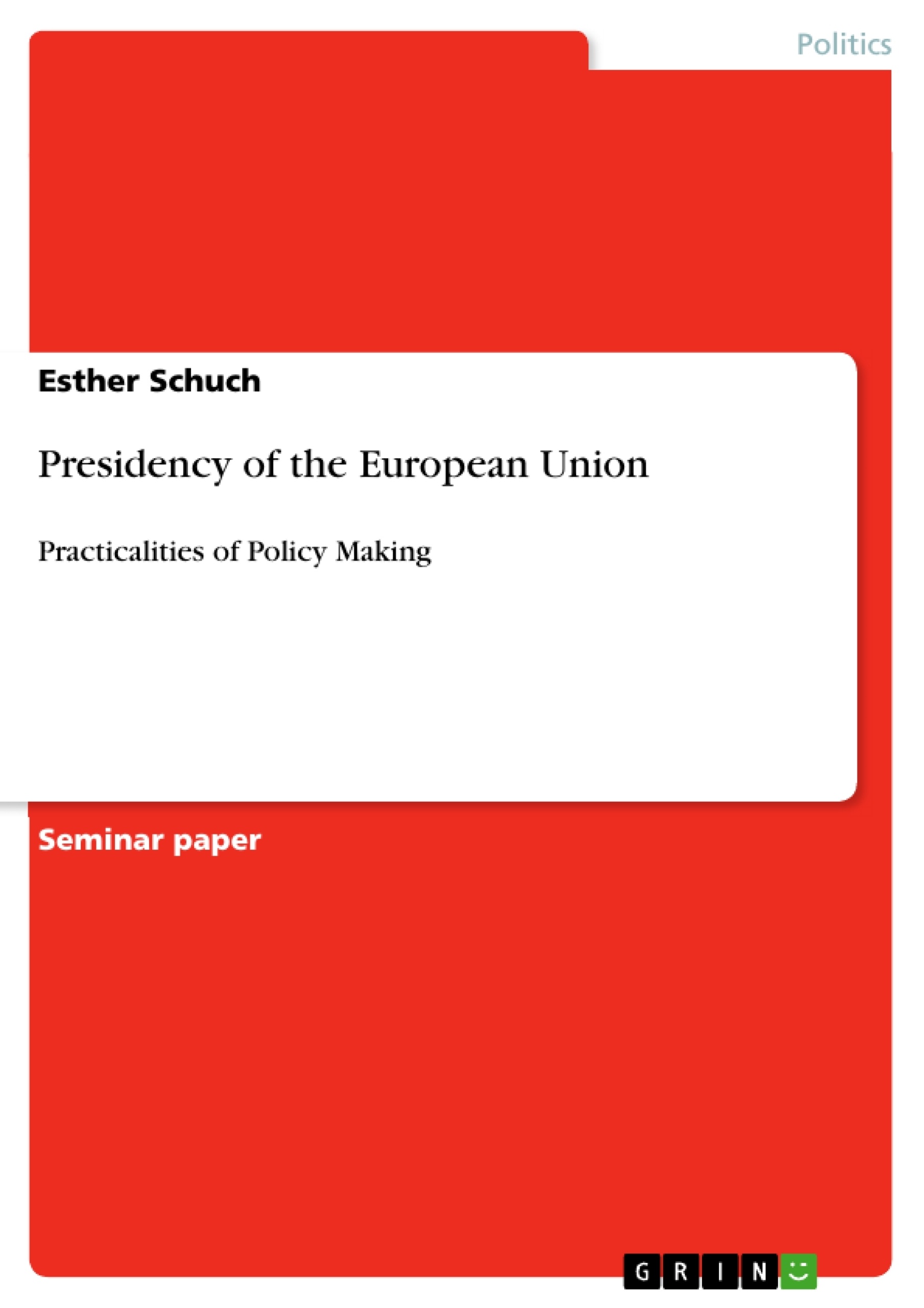When discussing the policy making of the European Union (EU) one has several actors to consider. This paper is going to analyse the role of the Presidency of the Council of Ministers and in how far it is possible for the President to influence, structure and guide policy making in the complex institutional setting of the EU. This also leaves room for 'good' and 'bad' presidencies. But what does it mean to have lead a good presidency or a failed one? One major issue that has to be kept in mind is that for the evaluation of a presidency there are so far no common guidelines. One attempt to introduce a method has been done by Schoutt and Vanhoonacker in their paper
„Evaluating Presidencies of the Council of the EU Revisiting“ of 2006. In this paper it becomes clear that fulfilling a good presidency depends on several factors and that this cannot be explained through the sheer size of a country.
Inhaltsverzeichnis (Table of Contents)
- Introduction
- The Presidency of the European Union
- Duties and Possibilities
- The Role of the Presidency in Decision-Making
- External Representation
- Evaluation of a Presidency
- A Contingency Theory
- Case Study: The French Presidency in 2000
Zielsetzung und Themenschwerpunkte (Objectives and Key Themes)
This paper analyzes the role and influence of the Presidency of the Council of Ministers within the European Union's policy-making process. It examines the capabilities of the Presidency to shape policy, considering both successful and unsuccessful presidencies. The paper also explores the lack of standardized evaluation methods for presidencies and proposes a contingency theory for a more objective assessment.
- The influence of the EU Presidency on policy-making
- The challenges and constraints faced by the Presidency
- Methods for evaluating the success of EU presidencies
- The role of the "troika" in ensuring policy consistency
- The importance of trust in the success of the Presidency
Zusammenfassung der Kapitel (Chapter Summaries)
The introduction sets the stage by outlining the complexities of EU policy-making and the need for a clearer evaluation method for presidencies. The main body delves into the responsibilities of the Presidency, including its administrative burdens, agenda-setting power, role in negotiations (especially trialogues), and external representation. It highlights the importance of acting as an "honest broker" to achieve fair agreements while navigating conflicting national interests. A case study of the 2000 French Presidency uses a contingency theory (demand and supply) to analyze its successes and failures, emphasizing the influence of external factors and the legacy of previous presidencies.
Schlüsselwörter (Keywords)
European Union, Presidency of the Council of Ministers, policy-making, agenda-setting, negotiation, trialogues, "honest broker," contingency theory, evaluation, Qualified Majority Voting (QMV), troika, institutional constraints, national interests, trust.
Frequently Asked Questions
What is the role of the Presidency of the Council of Ministers in the EU?
The Presidency is responsible for influencing, structuring, and guiding policy-making, as well as representing the Council externally.
How can a Presidency be evaluated as 'good' or 'bad'?
Evaluation often depends on factors like agenda-setting power, negotiation success, and the ability to act as an "honest broker" among member states.
What is the 'honest broker' concept?
It refers to the Presidency's duty to remain neutral and facilitate fair agreements while navigating the conflicting national interests of EU members.
Does the size of a country determine the success of its Presidency?
According to research cited in the paper, fulfilling a successful presidency cannot be explained through the sheer size of a country alone.
What is the significance of the 'troika'?
The troika helps ensure policy consistency and smooth transitions between successive presidencies within the European Union.
- Arbeit zitieren
- Bachelor of Arts Esther Schuch (Autor:in), 2007, Presidency of the European Union, München, GRIN Verlag, https://www.grin.com/document/183386



